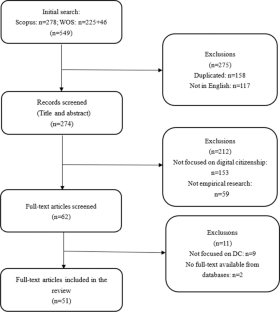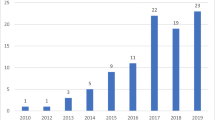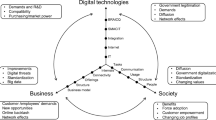Abstract
The pervasive use of the Internet and technology has its impact on citizens’ civic participation. There are growing numbers of research which explore digital citizenship (DC) for citizens’ better civic participation in the information society. With the growing attention of digital citizenship, a systematic review of empirical research focused on digital citizenship in the past decade (2010–2020) was conducted to serve the need of different stakeholders. Synthesis was based on research purposes, methods, population, geographic distribution, instruments and factors that affect digital citizenship. Results showed that the research of the DC empirical studies varied. The themes of DC practice, education and factors attracted attention. A few reliable and valid instruments have been developed to measure digital citizenship targeted for different populations. Demographic factors, Internet use factors, psychological factors and social factors of an individual predict one’s digital citizenship. These factors may serve as indicators for policy makers to draft DC policy and educators to plan for the DC program in the society. Suggestions are provided for practitioners based on the findings.




Similar content being viewed by others
References
Akcil, U., Altinay, Z., & Altinay, F. (2016). Assessing the effects of managers in the digital age on the management process of digital citizenship roles. Anthropologist, 23(1–2), 209–217.
Al-Abdullatif, A. M., & Gameil, A. A. (2020). Exploring students’ knowledge and practice of digital citizenship in higher education. International Journal of Emerging Technologies in Learning, 15(19), 122–142. https://doi.org/10.3991/ijet.v15i19.15611
Alazemi, A. F., Sa’di, I. T., & Al-Jamal, D. A. H. (2019). Effects of digital citizenship on EFL students’ success in writing. International Journal of Learning, Teaching and Educational Research, 18(4), 120–140. https://doi.org/10.26803/ijlter.18.4.7
Ata, R., & Yildirim, K. (2019). Turkish pre-service teachers’ perceptions of digital citizenship in education programs. Journal of Information Technology Education: Research, 18, 419–436. https://doi.org/10.28945/4392
Bennett, W. L. (2008). Changing citizenship in the digital age. In W. L. Bennett (Ed.), Civic life online: Learning how digital media can engage youth (pp. 1–24). The MIT Press.
Blaj-Ward, L., & Winter, K. (2019). Engaging students as digital citizens. Higher Education Research and Development, 38(5), 879–892. https://doi.org/10.1080/07294360.2019.1607829
Boulianne, S. (2009). Does Internet use affect engagement? A meta-analysis of research. Political Communication, 26(2), 193–211. https://doi.org/10.1080/10584600902854363
Callan, E. (2004). Citizenship and education. Annual Review of Political Science, 7, 71–79. https://doi.org/10.1146/annurev.polisci.7.012003.104924
Cebi, A., & Ozdemir, T. B. (2019). The role of digital nativity and digital citizenship in predicting high school students’ online information searching strategies. Egitim Ve Bilim-Education and Science, 44(200), 47–57. https://doi.org/10.15390/EB.2019.8379
Chen, L. L., Mirpuri, S., Rao, N., & Law, N. (2021). Conceptualization and measurement of digital citizenship across disciplines. Educational Research Review, 33, 100379. https://doi.org/10.1016/j.edurev.2021.100379
Choi, M. (2016). A concept analysis of digital citizenship for democratic citizenship education in the internet age. Theory & Research in Social Education, 44(4), 1–43. https://doi.org/10.1080/00933104.2016.1210549
Choi, M., Glassman, M., & Cristol, D. (2017). What it means to be a citizen in the internet age: Development of a reliable and valid digital citizenship scale. Computers & Education, 107, 100–112. https://doi.org/10.1016/j.compedu.2017.01.002
Choi, M., Cristol, D., & Gimbert, B. (2018). Teachers as digital citizens: The influence of individual backgrounds, internet use and psychological characteristics on teachers’ levels of digital citizenship. Computers & Education, 121, 143–161. https://doi.org/10.1016/j.compedu.2018.03.005
Creswell, J. W., & Clark, V. L. P. (2017). Designing and conducting mixed methods research. Sage publications.
Crnic, O. T. (2017). Neglected or just misunderstood? The perception of youth and digital citizenship among Slovenian political parties. Teorija in Praksa, 54, 96–111.
Crow, B., & Longford, C. (2000). Digital restructuring: Gender, class and citizenship in the information society in Canada. Citizenship Studies, 4(2), 207–230. https://doi.org/10.1080/13621020050078096
Dean, H. (2001). Green citizenship. Social Policy & Administration, 35(5), 490–505. https://doi.org/10.1111/1467-9515.t01-1-00249
Dimitriadi, Y. (2019). Who you’re gonna call? The development of university digital leaders, a case study. Mediaeval Studies, 10(19), 102–118. https://doi.org/10.20901/ms.10.19.6
Elcicek, M., Erdemci, H., & Karal, H. (2018). Examining the relationship between the levels of digital citizenship and social presence for the graduate students having online education. Turkish online journal of. Distance Education, 19(1), 203–214. https://doi.org/10.17718/tojde.382801
Elmali, F., Tekin, A., & Polat, E. (2020). A study on digital citizenship: Preschool teacher candidates vs. computer education and instructional technology teacher candidates. Turkish online journal of. Distance Education, 21(4), 251–269. https://doi.org/10.17718/tojde.803423
Gazi, Z. A. (2016). Internalization of digital citizenship for the future of all levels of education. Egitim -Ve Bilim-Education and Science, 41(186), 137–148. https://doi.org/10.15390/EB.2016.4533
Ghosn-Chelala, M. (2019). Exploring sustainable learning and practice of digital citizenship: Education and place-based challenges. Education, Citizenship and Social Justice, 14(1), 40–56.
Gough, D., Oliver, S., & Thomas, J. (2012). An introduction to systematic reviews. Sage.
Hava, K., & Gelibolu, M. F. (2018). The impact of digital citizenship instruction through flipped classroom model on various variables. Contemporary Educational Technology, 9(4), 390–404. https://doi.org/10.30935/cet.471013
Heider, K. L., & Jalongo, M. R. (2014). Young children and families in the information age: Applications of technology in early childhood. Springer.
Hermes, J. (2006). Citizenship in the age of the internet. European Journal of Communication, 21(3), 295–309. https://doi.org/10.1177/0267323106066634
Hill, V. (2015). Digital citizenship through game design in Minecraft. New Library World, 116(7–8), 369–382. https://doi.org/10.1108/NLW-09-2014-0112
Hintz, A., & Brown, I. (2017). Enabling digital citizenship? The reshaping of surveillance policy after Snowden. International Journal of Communication, 11, 782–801.
Hollandsworth, R., Donovan, J., & Welch, M. (2017). Digital citizenship: You Can’t go home again. TechTrends, 61(6), 524–530.
Hui, B., & Campbell, R. (2018). Discrepancy between learning and practicing digital citizenship. Journal of Academic Ethics, 16(2), 117–131. https://doi.org/10.1007/s10805-018-9302-9
International Society for Technology in Education (ISTE) (2019). ISTE standards for educators. Retrieved from https://www.iste.org/standards/for-students. Accessed 6 June 2021.
Isin, E. F., & Turner, B. S. (2002). Handbook of citizenship studies. Sage.
Isman, A., & Canan Gungoren, O. (2014). Digital citizenship. Turkish Online Journal of Educational Technology, 13(1), 73–77.
Johanson, G. A., & Brooks, G. P. (2010). Initial Scale development: sample size for pilot studies. Educational and Psychological Measurement, 70(3), 394–400. https://doi.org/10.1177/0013164409355692
Jones, L. M., & Mitchell, K. J. (2016). Defining and measuring youth digital citizenship. New Media & Society, 18(9), 2063–2079. https://doi.org/10.1177/1461444815577797
Jørring, L., Valentim, A., & Porten-Cheé, P. (2019). Mapping a changing field-a literature review on digital citizenship. Digital Culture & Society, 4(2), 11–37.
Kara, N. (2018). Understanding university students’ thoughts and practices about digital citizenship: A mixed methods study. Educational Technology & Society, 21(1), 172–185.
Karaduman, H. (2017). Social studies teacher candidates’ opinions about digital citizenship and its place in social studies teacher training program: A comparison between the USA and Turkey. Turkish Online Journal of Educational Technology, 16(2), 93–106.
Khan, K. S., Kunz, R., Kleijnen, J., & Antes, G. (2003). Five steps to conducting a systematic review. Journal of the Royal Society of Medicine, 96(3), 118–121. https://doi.org/10.1258/jrsm.96.3.118
Kim, M., & Choi, D. (2018). Development of youth digital citizenship scale and implication for educational setting. Educational Technology & Society, 21(1), 155–171.
Korucu, A. T., & Totan, H. N. (2019). Researching into a course of information technologies and software in the context of digital citizenship through student opinions. Participatory. Educational Research, 6(1), 84–97. https://doi.org/10.17275/per.19.7.6.1
Kwon, H. K., Sao, C., & Nah, S. (2020). Localized social media and civic life: Motivations, trust, and civic participation in local community contexts. Journal of Information Technology and Politics, 18(1), 55–69. https://doi.org/10.1080/19331681.2020.1805086
Lauricella, A. R., Herdzina, J., & Robb, M. (2020). Early childhood educators' teaching of digital citizenship competencies. Computers & Education, 158, 103989. https://doi.org/10.1016/j.compedu.2020.103989
Lokot, T. (2020). Articulating networked citizenship on the Russian internet: A case for competing affordances. Social Media+ Society, 6(4), 1–12. https://doi.org/10.1177/2056305120984459
Lozano-Diaz, A., & Fernandez-Prados, J. S. (2020). Educating digital citizens: An opportunity to critical and activist perspective of sustainable development goals. Sustainability (Switzerland), 12(18), 1–14.
Manzuoli, C. H., Sánchez, A. V., & Bedoya, E. D. (2019). Digital citizenship: A theoretical review of the concept and trends. Turkish Online Journal of Educational Technology, 18(2), 10–18.
Martin, F., Gezer, T., & Wang, C. (2019). Educators’ perceptions of student digital citizenship practices. Computers in the Schools, 36(4), 238–254. https://doi.org/10.1080/07380569.2019.1674621
Martin, F., Gezer, T., Wang, W. C., Petty, T., & Wang, C. (2020a). Examining K-12 educator experiences from digital citizenship professional development. Journal of Research on Technology in Education. https://doi.org/10.1080/15391523.2020.1815611
Martin, F., Hunt, B., Wang, C., & Brooks, E. (2020b). Middle school student perception of technology use and digital citizenship practices. Computers in the Schools, 37(3), 196–215. https://doi.org/10.1080/07380569.2020.1795500
Masrom, M. B., Busalim, A. H., Abuhassna, H., & Mahmood, N. H. N. (2021). Understanding students’ behavior in online social networks: A systematic literature review. International Journal of Educational Technology in Higher Education, 18(1), 1–27. https://doi.org/10.1186/s41239-021-00240-7
Millard, A., Baldassar, L., & Wilding, R. (2018). The significance of digital citizenship in the well-being of older migrants. Public Health, 158, 144–148. https://doi.org/10.1016/j.puhe.2018.03.005
Mossberger, K., Tolbert, C. J., & McNeal, R. S. (2008). Digital citizenship. MIT Press.
Mossberger, K., Tolbert, C. J., & Hamilton, A. (2012). Measuring digital citizenship: Mobile access and broadband. International Journal of Communication, 6, 2492–2528.
Mossberger, K., Tolbert, C. J., & Anderson, C. (2017). The mobile internet and digital citizenship in African-American and Latino communities. Information Communication & Society, 20(10), 1587–1606. https://doi.org/10.1080/1369118x.2016.1243142
Ong, A. (2006). Mutations in citizenship. Theory, Culture & Society, 23(2–3), 499–531. https://doi.org/10.1080/1369118X.2016.1243142
Osler, A., & Starkey, H. (2005). Changing citizenship: Democracy and inclusion in education. Open University Press.
Özgür, H. (2016). The relationship between internet parenting styles and internet usage of children and adolescents. Computers in Human Behavior, 60, 411–424. https://doi.org/10.1016/j.chb.2016.02.081
Panke, S., & Stephens, J. (2018). Beyond the echo chamber: Pedagogical tools for civic engagement discourse and reflection. Educational Technology and Society, 21(1), 248–263.
Phillips, A. L., & Lee, V. R. (2019). Whose responsibility is it? A statewide survey of school librarians on responsibilities and resources for teaching digital citizenship. School Library Research, 22, 1–20.
Pierre, E. A. S., & Jackson, A. Y. (2014). Qualitative data analysis after coding. Qualitative Inquiry, 20(6), 715–719. https://doi.org/10.1177/1077800414532435
Ribble, M. (2015). Digital Citizenship in Schools: Nine Elements All Students Should Know (3rd ed.). Washington DC: International Society for Technology in Education.
Ribble, M., & Bailey, G. (2007). Digital citizenship in schools. ISTE.
Ribble, M., Bailey, G., & Ross, T. W. (2004). Addressing appropriate technology behavior. Learning & Leading with Technology, 32(1), 6–12.
Richardson, J. W., Martin, F., & Sauers, N. (2021). Systematic review of 15 years of research on digital citizenship: 2004–2019. Learning, Media and Technology. https://doi.org/10.1080/17439884.2021.1941098
Sandelowski, M., Voils, C. I., Leeman, J., & Crandell, J. L. (2011). Mapping the mixed methods–mixed research synthesis terrain. Journal of Mixed Methods Research., 6(4), 317–331. https://doi.org/10.1177/1558689811427913
Schou, J., & Hjelholt, M. (2018). Digital citizenship and neoliberalization: Governing digital citizens in Denmark. Citizenship Studies, 22(5), 507–522. https://doi.org/10.1080/13621025.2018.1477920
Schou, J., & Hjelholt, M. (2019). Digitalizing the welfare state: Citizenship discourses in Danish digitalization strategies from 2002 to 2015. Critical Policy Studies, 13(1), 3–22. https://doi.org/10.1080/19460171.2017.1333441
Shields, N., & Kane, J. (2011). Social and psychological correlates of internet use among college students. Cyberpsychology: Journal of Psychosocial Researches on Cyberspace, 5(1), article 2.
Shin, W. (2015). Parental socialization of children’s internet use: A qualitative approach. New Media & Society, 17(5), 649–665. https://doi.org/10.1177/1461444813516833
Son, J. E., Lee, S. H., Cho, E. Y., & Kim, H. W. (2016). Examining online citizenship behaviors in social network sites: A social capital perspective. Behavior & Information Technology, 35(9), 730–747. https://doi.org/10.1080/0144929X.2016.1143032
Tapingkae, P., Panjaburee, P., Hwang, G. J., & Srisawasdi, N. (2020). Effects of a formative assessment-based contextual gaming approach on students’ digital citizenship behaviours, learning motivations, and perceptions. Computers & Education, 159, 103998. https://doi.org/10.1016/j.compedu.2020.103998
Thannimalai, R., & Raman, A. (2018). The influence of principals’ technology leadership and professional development on teachers’ technology integration in secondary schools. Malaysian Journal of Learning and Instruction, 15(1), 203–228.
Torres-Gastelú, C. A., Angulo-Armenta, J., Lagunes-Domínguez, A., & Soto-Ortíz, J. L. (2017). Vestiges of a digital citizenship in students of a Mexican University. TOJET. The Turkish Online Journal of Educational Technology, 920–928.
Trapero, F. G. A., Vázquez Parra, J. C., & Martínez, M. D. J. G. (2020). Digital citizenship approach and teacher profile. Education in the Knowledge Society, 21(6), 1–11. https://doi.org/10.14201/eks.20954
Tricco, A. C., Lillie, E., Zarin, W., O'Brien, K. K., Colquhoun, H., Levac, D., et al. (2018). PRISMA extension for scoping reviews (PRISMA-ScR): Checklist and explanation. Annals of Internal Medicine, 169(7), 467–473. https://doi.org/10.7326/M18-0850
Wahl-Jorgensen, K., Bennett, L., & Taylor, G. (2017). The normalization of surveillance and the invisibility of digital citizenship: Media debates after the Snowden revelations. International Journal of Communication, 11, 740–763.
Walters, M. G., Gee, D., & Mohammed, S. (2019). A literature review: Digital citizenship and the elementary educator. International Journal of Technology in Education (IJTE), 2(1), 1–21.
Wang, X., & Xing, W. L. (2018). Exploring the influence of parental involvement and socioeconomic status on teen digital citizenship: A path modeling approach. Educational Technology and Society, 21(1), 186–199.
Winarnita, M., Bahfen, N., Mintarsih, A. R., Height, G., & Byrne, J. (2020). Gendered digital citizenship: How Indonesian female journalists participate in gender activism. Journalism Practice. https://doi.org/10.1080/17512786.2020.1808856
Windle, G., Bennett, K. M., & Noyes, J. (2011). A methodological review of resilience measurement scales. Health and Quality of Life Outcomes, 9(8), 1–18. https://doi.org/10.1186/1477-7525-9-8
Xu, S., Yang, H. H., MacLeod, J., & Zhu, S. (2019a). Interpersonal communication competence and digital citizenship among pre-service teachers in China’s teacher preparation programs. Journal of Moral Education, 48(2), 179–198. https://doi.org/10.1080/03057240.2018.1458605
Xu, S,Yang, H. H, MacLeod, J., & Zhu, S. (2019b). Social media competence and digital citizenship among college students. Convergence: The International Journal of Research into New Media Technologies, 25(4) 735–752. https://doi.org/10.1177/1354856517751390.
Yıldız, E. P., Çengel, M., & Alkan, A. (2020). Determination of digital citizenship levels of university students at Sakarya university Turkey. International Journal of Higher Education, 9(3), 300–308. https://doi.org/10.5430/ijhe.v9n3p300
Yue, A., Nekmat, E., & Beta, A. R. (2019). Digital literacy through digital citizenship: Online civic participation and public opinion evaluation of youth minorities in Southeast Asia. Media and communication, 7(2), 100–114. https://doi.org/10.17645/mac.v7i2.1899.
Zoghbi-Manrique-de-Lara, P., & Viera-Armas, M. (2017). Corporate culture as a mediator in the relationship between ethical leadership and personal internet use. Journal of Leadership & Organizational Studies, 24(3), 357–371. https://doi.org/10.1177/1548051817696877
Author information
Authors and Affiliations
Corresponding author
Additional information
Publisher’s note
Springer Nature remains neutral with regard to jurisdictional claims in published maps and institutional affiliations.
Rights and permissions
Springer Nature or its licensor holds exclusive rights to this article under a publishing agreement with the author(s) or other rightsholder(s); author self-archiving of the accepted manuscript version of this article is solely governed by the terms of such publishing agreement and applicable law.
About this article
Cite this article
Shi, G., Chan, K.K. & Lin, XF. A systematic review of digital citizenship empirical studies for practitioners. Educ Inf Technol 28, 3953–3975 (2023). https://doi.org/10.1007/s10639-022-11383-z
Received:
Accepted:
Published:
Issue Date:
DOI: https://doi.org/10.1007/s10639-022-11383-z




